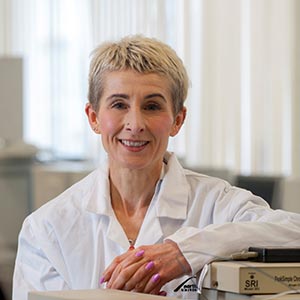Introducing Professor Dianne Ford
What developed your interest in researching age-related diseases and their links to nutrition?
As a scientist who is intrigued by the molecular mechanisms through which nutrition impinges on health, I became gripped when molecular details of the long-studied effect of dietary restriction to extend the lifespan of mice and other simpler experimental animals (such as flies and worms) began to emerge. In particular, some of this evidence pointed towards the involvement of proteins known as sirtuins. The sirtuins have effects on the DNA that are known as ‘epigenetic’ actions. Epigenetic changes in DNA are probably partly responsible for ageing and age-related diseases. The emerging evidence that sirtuins may be important in the way that dietary restriction works, suggested to me that their epigenetic actions may be key in this response. I won some funding to carry out research to test this idea from a scheme (SPARC) that was designed specifically to bring new researchers who were already established in other fields into the field of ageing. From that point, I never looked back!
Currently, what is the key focus of your research?
At present, a major focus is on the interaction between the sirtuins and a groups of enzymes, known as PARPs, that repair DNA. I am working on this topic in collaboration with Professor Nicola Curtin, Newcastle University. We know that PARPs are more active in males than in females in most tissues, and that most age-related diseases occur more frequently in males than in females. Intriguingly, Alzheimer’s disease, being more frequent in females, is a notable exception, and the only tissue in which PARP is more active in females than in males is the brain. One aspect of our work is to determine the effect of PARP activity (and its ‘knock-on’ effect of sirtuin activity) on age-related diseases.
What has been the most surprising finding during your research career?
We discovered that we were correct in predicting that sirtuins would have epigenetic effects. However, we were surprised to find that these effects cluster in the same genes where most of the epigenetic changes that we see in ageing occur. Of course, this all makes sense but what was surprising was that all too often our scientific discoveries are just not so ‘neat’.
When people learn you are involved in research on nutrition and ageing, what is the main thing they ask?
Of course they ask what they should eat to stay young! There’s an easy answer, which will provide sound general nutritional advice; eat plenty of vegetables and fruit and avoid too much fat and sugar. However, I think at present the evidence that particular ‘superfoods’ can have an effect on ageing is not sufficient to be able to advocate any particular practices in this respect. That’s not to say that specific foods may not have particular beneficial effects. However, it is likely that certain foods will be of particular benefit in specific individuals depending on genetic makeup and other factors, such as lifestyle practices.
In your opinion, how important is collaboration and integrating multiple research strategies to unravel the complexities of Alzheimer’s and other age-related diseases?
Collaboration is absolutely essential. As individual scientists we can address only specific aspects of the whole process, which is multifactorial and highly complex. To make real advances and to really make a difference to patients an approach that embraces molecular studies right through to studies on the more social aspects of managing these diseases is essential.
Tell us something about yourself that keeps you motivated and that might surprise us
I have a steadfast belief that I will live to a very old age! This belief has no scientific basis whatsoever (expect perhaps that my relatives have tended to live long lives). I couldn’t say that I am motivated in my research by any personal search for the ‘elixir of youth’ that will keep me healthy throughout all these years ahead. I think perhaps the fact that I am a driven and motivated individual is what will keep me going for so long!
And finally … is there a question that you’ve always wished someone would ask about your research, but never has?
I had to think very hard about this one. It’s not really a question about my research, but about being a researcher. I would like to be asked about the most important contribution I think I have made to advancing scientific research in the area of nutrition and health. The answer is not a particular piece of work or discovery, but that my role has allowed me to contribute to the development of so many talented young scientists. It’s a real privilege to work with and help to develop new researchers. I think this is the way in which I have made the biggest contribution and the thing about which I am proudest.
Professor Dianne Ford is a molecular and cell biologist, Pro Vice Chancellor, Professor of Molecular Nutrition and Executive Dean of the Faculty of Health & Life Sciences at Northumbria University (UK). She is also a Fellow of the Society of Biology.
Dianne has been extensively involved in researching how our diet interacts with cellular function and affects our health throughout our lifetime. One specific area of her research has looked at a group of proteins called sirtuins that have been linked to protection against ageing-related diseases such as Alzheimer’s.
Find out more about Professor Dianne Ford’s research by visiting her website at the University of Northumbria.


